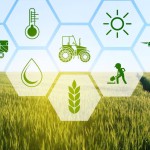Civilization came into existence with agriculture. Our society had a quantum leap when our nomadic ancestors began to cultivate and grow their food. Not only did villages, towns, and metropolitan cities begin to flourish, so did knowledge and technological science. And for most of our histories, the society's connection to the land was definitely intimate. Human communities, no matter how sophisticated, could not deny and ignore the significance of agriculture. To be far from dependable sources of food was to risk malnutrition and abject starvation. In modern times, however, many in the urban have disremembered this fundamental yet significant connection.
It was only some years ago that member countries of ours pledged to fight against the persistent and omnipresent issue of hunger. Relevant authorities had vowed to provide political will and adequate resources to ensure that more and more people will be accessible to food. Yet till today, regrettably, food insecurity is still a major challenge to developing countries, even in Malaysia. Based on a survey conducted in 2021 by the World Bank, the percentage of food-insecure people, especially in low-income families, is staggeringly high at 17 percent, far from the target to eradicate poverty and hunger. This showcases the immense importance of the agriculture sector to the economy and growth of Malaysia.
To further emphasize the importance of the agriculture sector to the economy of Malaysia, priority is also given to the development of agro-based industries. Malaysia is a country that has a climate appropriate for such development, with plentiful supplies of resources and lands. It is capable of producing rice, tropical food, and vegetables in abundance. Hence, such prioritization is expected to create employment, attract foreign revenues, and also enhance the nation's food security.
Malaysia's shift in priority towards agriculture and promoting it as a vital engine of growth requires putting it back on the forefront of the country's economic agenda. Exciting new plans and innovative ways have been drawn up by the Malaysian government to transform this traditional sector into a modern enterprise. It entails a complete transformation of the agriculture sector and, at the same time, warrants a paradigm shift in approaches toward agriculture in terms of planning and implementation. It means addressing the attitudes of farmers as well as their readiness to adapt to technological advances. It also means providing training and making technology more accessible to farmers. This certainly is a Herculean task, but is undoubtedly rewarding as the sector becomes the mainstay of the nation's economy.
It is noteworthy that agricultural trades may contribute to the diminishment of poverty and food insecurity in Malaysia. Nonetheless, some developing countries find it difficult to gain access to markets of developed countries due to stringent rules and regulations on food safety and quality standards. The implication of such rules and regulations is that market access for products from developing countries appears increasingly restrained which as a repercussion becomes a setback to reducing hunger and poverty. The cardinal question for countries like Malaysia and other developing countries is whether these additional rules and regulations are mandatory. While we welcome such initiatives as they bring positive benefits to the agriculture sector particularly in improving the quality of products in the long run, the capacity of developing countries to comply with these standards should also be given due consideration.
Furthermore, as agriculture becomes an important engine of growth for Malaysia, the associated sector should be prepared to confront challenges and competitiveness inherent at the global level. The implementation of the ASEAN Free Trade Area (AFTA) for example, has brought about colossal changes in the trend of the world's agricultural trade, which has directly affected the agriculture sector in Malaysia and ascertained its preparedness. Therefore, self-sufficiency in food supplies, as well as the standards of food quality and safety, need to be ensured.
At this point, it is worth noting that major crops planted in Malaysia include oil palm, rubber, rice, mixed horticulture, coconut, and orchard. Overdependence on these primary commodities has made it necessary to use a great number of chemical fertilizers to sustain yield, which necessitates importation. However, due to growing concern about health hazards posed by chemical fertilizers in recent years, there is now a concerted effort to review the use of these fertilizers and place more emphasis on the use of organic fertilizers. These efforts have resulted in the recycling of organic waste and by-products for productive use and substantially reduced indiscriminate disposal or burning of waste products which will lead to soil, water, and air pollution.
As a concluding remark, agriculture plays an indispensable role in the development and stability of the Malaysian economy. This is palpably substantiated by how it helps to provide food security, generate income for farmers, create job opportunities, as well as diversify the economy. As agriculture is a prominent source of raw materials for numerous industries, it also facilitates the preservation of the country's natural resources. Therefore, the government and private sector should hand in glove and provide perpetual support to the agriculture sector in Malaysia for its growth and sustainability.










